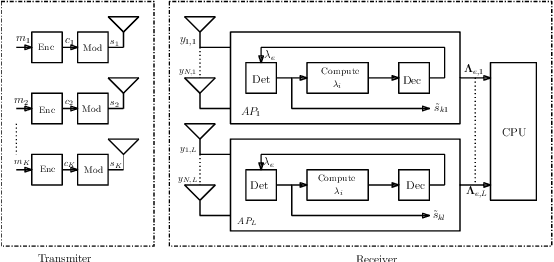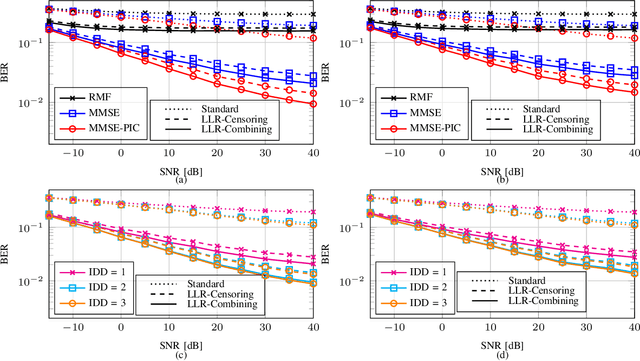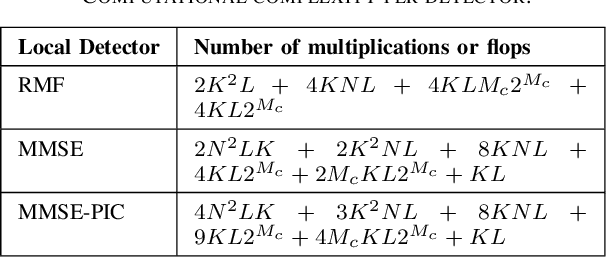R. C. de Lamare
Study of Robust Resource Allocation in Cell-Free Multiple-Antenna Networks
May 17, 2025Abstract:Cell-free networks outperform cellular networks in many aspects, yet their efficiency is affected by imperfect channel state information (CSI). In order to address this issue, this work presents a robust resource allocation framework designed for the downlink of user-centric cell-free massive multi-input multi-output (CF-mMIMO) networks. This framework employs a sequential resource allocation strategy with a robust user scheduling algorithm designed to maximize the sum-rate of the network and two robust power allocation algorithms aimed at minimizing the mean square error, which are developed to mitigate the effects of imperfect CSI. An analysis of the proposed robust resource allocation problems is developed along with a study of their computational cost. Simulation results demonstrate the effectiveness of the proposed robust resource allocation algorithms, showing a performance improvement of up to 30\% compared to existing techniques.
Iterative Detection and Decoding for Clustered Cell-Free Massive MIMO Networks
Dec 14, 2024



Abstract:In this letter, we propose an iterative soft interference cancellation scheme for intra-cluster (ICL) and out-of-cluster (OCL) interference mitigation in user-centric clustered cell-free massive multiple-antenna networks. We propose a minimum mean-square error receive filter with a novel modified parallel interference cancellation scheme to mitigate ICL and OCL interference. Unlike prior work, we model the OCL interference and devise a least squares estimator to perform OCL interference estimation. An iterative detection and decoding scheme that adopts low-density parity check codes and incorporates the OCL interference estimate is developed. Simulations assess the proposed scheme against existing techniques in terms of bit error rate performance.
Study of Iterative Detection and Decoding for RIS-Aided Multiuser Multi-Antenna Systems
Nov 03, 2024



Abstract:We present a novel iterative detection and decoding (IDD) scheme for Reconfigurable Intelligent Surface (RIS)-assisted multiuser multiple-antenna systems. The proposed approach introduces a joint iterative detection strategy that integrates Low-Density Parity-Check (LDPC) codes, RIS processing and iterative detection and decoding. In particular, we employ a minimum mean square error receive filter that performs truncation at the RIS and soft interference cancelation at the receiver. Simulation results evaluate the system's overall capacity and bit error rate, and demonstrate substantial improvements in bit error rate across block-fading channels.
Analysis of Partially-Calibrated Sparse Subarrays for Direction Finding with Extended Degrees of Freedom
Aug 06, 2024Abstract:This paper investigates the problem of direction-of-arrival (DOA) estimation using multiple partially-calibrated sparse subarrays. In particular, we present the Generalized Coarray Multiple Signal Classification (GCA-MUSIC) DOA estimation algorithm to scenarios with partially-calibrated sparse subarrays. The proposed GCA-MUSIC algorithm exploits the difference coarray for each subarray, followed by a specific pseudo-spectrum merging rule that is based on the intersection of the signal subspaces associated to each subarray. This rule assumes that there is no a priori knowledge about the cross-covariance between subarrays. In that way, only the second-order statistics of each subarray are used to estimate the directions with increased degrees of freedom, i.e., the estimation procedure preserves the coarray Multiple Signal Classification and sparse arrays properties to estimate more sources than the number of physical sensors in each subarray. Numerical simulations show that the proposed GCA-MUSIC has better performance than other similar strategies.
Study of Robust Direction Finding Based on Joint Sparse Representation
May 27, 2024Abstract:Standard Direction of Arrival (DOA) estimation methods are typically derived based on the Gaussian noise assumption, making them highly sensitive to outliers. Therefore, in the presence of impulsive noise, the performance of these methods may significantly deteriorate. In this paper, we model impulsive noise as Gaussian noise mixed with sparse outliers. By exploiting their statistical differences, we propose a novel DOA estimation method based on sparse signal recovery (SSR). Furthermore, to address the issue of grid mismatch, we utilize an alternating optimization approach that relies on the estimated outlier matrix and the on-grid DOA estimates to obtain the off-grid DOA estimates. Simulation results demonstrate that the proposed method exhibits robustness against large outliers.
Iterative Detection and Decoding Schemes with LLR Refinements in Cell-Free Massive MIMO Networks
May 22, 2024


Abstract:In this paper, we propose low-complexity local detectors and log-likelihood ratio (LLR) refinement techniques for a coded cell-free massive multiple input multiple output (CF- mMIMO) systems, where an iterative detection and decoding (IDD) scheme is applied using parallel interference cancellation (PIC) and access point (AP) selection. In particular, we propose three LLR processing schemes based on the individual processing of the LLRs of each AP, LLR censoring, and a linear combination of LLRs by assuming statistical independence. We derive new closed-form expressions for the local soft minimum mean square error (MMSE)-PIC detector and receive matched filter (RMF). We also examine the system performance as the number of iterations increases. Simulations assess the performance of the proposed techniques against existing approaches.
Study of Clustering Techniques and Scheduling Algorithms with Fairness for Cell-Free MIMO Networks
Apr 27, 2024



Abstract:In this work, we propose a clustering technique based on information rates for cell-free massive multiple-input multiple-output (MIMO) networks. Unlike existing clustering approaches that rely on the large scale fading coefficients of the channels and user-centric techniques, we develop an approach that is based on the information rates of cell-free massive MIMO networks. We also devise a resource allocation technique to incorporate the proposed clustering and schedule users with fairness. An analysis of the proposed clustering approach based on information rates is carried out along with an assessment of its benefits for scheduling. Numerical results show that the proposed techniques outperform existing approaches.
Study of Noncoherent Sparse Subarrays for Direction Finding Based on Low-Rank and Sparse Recovery
Feb 24, 2024Abstract:This paper investigates the problem of noncoherent direction-of-arrival (DOA) estimation using different sparse subarrays. In particular, we present a Multiple Measurements Vector (MMV) model for noncoherent DOA estimation based on a low-rank and sparse recovery optimization problem. Moreover, we develop two different practical strategies to obtain sparse arrays and subarrays: i) the subarrays are generated from a main sparse array geometry (Type-I sparse array), and ii) the sparse subarrays that are directly designed and grouped together to generate the whole sparse array (Type-II sparse array). Numerical results demonstrate that the proposed MMV model can benefit from multiple data records and that Type-II sparse noncoherent arrays are superior in performance for DOA estimation
Study of Adaptive LLR-based AP selection for Grant-Free Random Access in Cell-Free Networks
Dec 28, 2023Abstract:This paper presents an iterative detection and decoding scheme along with an adaptive strategy to improve the selection of access points (APs) in a grant-free uplink cell-free scenario. With the requirement for the APs to have low-computational power in mind, we introduce a low-complexity scheme for local activity and data detection. At the central processing unit (CPU) level, we propose an adaptive technique based on local log-likelihood ratios (LLRs) to select the list of APs that should be considered for each device. Simulation results show that the proposed LLRs-based APs selection scheme outperforms the existing techniques in the literature in terms of bit error rate (BER) while requiring comparable fronthaul load.
Tomlinson-Harashima Cluster-Based Precoders for Cell-Free MU-MIMO Networks
Dec 26, 2023Abstract:Cell-free (CF) multiple-input multiple-output (MIMO) systems generally employ linear precoding techniques to mitigate the effects of multiuser interference. However, the power loss, efficiency, and precoding accuracy of linear precoders are usually improved by replacing them with nonlinear precoders that employ perturbation and modulo operation. In this work, we propose nonlinear user-centric precoders for CF MIMO, wherein different clusters of access points (APs) serve different users in CF multiple-antenna networks. Each cluster of APs is selected based on large-scale fading coefficients. The clustering procedure results in a sparse nonlinear precoder. We further devise a reduced-dimension nonlinear precoder, where clusters of users are created to reduce the complexity of the nonlinear precoder, the amount of required signaling, and the number of users. Numerical experiments show that the proposed nonlinear techniques for CF systems lead to an enhanced performance when compared to their linear counterparts.
 Add to Chrome
Add to Chrome Add to Firefox
Add to Firefox Add to Edge
Add to Edge